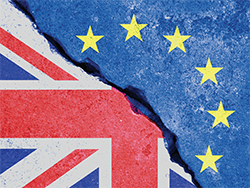As the page turns on another year – and decade – industry leaders from across the Channel Islands share their views on the challenges and opportunities that lie ahead
Twenty-twenty vision is beneficial at any time, but as we wave goodbye to 2019 and enter the year 2020, having a clear view of what’s in store for the 12 months ahead is particularly topical.
Some major foreseeable events are likely to shape the year ahead – the US presidential election late in the year and Brexit, to name just two. But what’s harder to anticipate is the effect of events that we’re not even aware of yet – Donald Rumsfeld’s “unknown unknowns”.
And longer-term trends will also play a significant role in shaping the landscape ahead, especially in areas such as the environment and technology. So, what do Channel Islands business leaders see as the key challenges and opportunities this year?
 THE CHALLENGES
THE CHALLENGES
1. Brexit
UK Prime Minister Boris Johnson won his much sought-after majority and, by the time you read this, the UK may well have effectively left the European Union. But that doesn’t mean there aren’t still major challenges ahead. “The challenge is that we are still only halfway there,” says Andrew Shepherd, Chief Executive at investment manager and financial planner Brooks Macdonald International.
“The uncertainty of how the trade negotiations are going to pan out will make it difficult to make investment decisions. We need to see more clarity, which we’ll start to get as we move through 2020.”
Jersey Finance CEO Joe Moynihan adds: “Jersey is not part of the EU or the UK, so our access to the EU for financial services is not dependent on the UK, because our regulator has agreements across the member states on a bilateral basis.
"Nevertheless, we are very much aligned with the City of London and a lot of our business comes through there, so in the longer term anything that turns out to be bad for the City would have implications for Jersey.”
2. Trade wars
 US tariffs last year were largely responsible for the recent slowdown in global growth, says Michel Perera, Chief Investment Officer of Canaccord Genuity Wealth Management, but the markets may be premature in assuming that the announced ‘Phase 1’ deal between China and the US marks the end of the trade war.
US tariffs last year were largely responsible for the recent slowdown in global growth, says Michel Perera, Chief Investment Officer of Canaccord Genuity Wealth Management, but the markets may be premature in assuming that the announced ‘Phase 1’ deal between China and the US marks the end of the trade war.
“The US is now turning to Europe for tariffs,” he says. “Also, President Trump is trumpeting his China deal to help his re-election. But there’s nothing to stop him from slapping on tariffs again after the election. So the world will have to get used to lower growth and uncertainty on trade for some time.”
From Jersey’s perspective, manufacturing goods and import/export are relatively small parts of the economy, adds Moynihan, and the main impact of trade tariffs is their effect on slowing global trade, reducing capital flows and curtailing private wealth.
“One potential area we would be concerned about is if (Trump) goes after European financial institutions. Since many of those institutions have operations here, that could have an impact on Jersey.”
3. Financial markets
Will the long-running bull market continue throughout 2020, or are we set for a sharp correction, as some commentators expect? Everyone knows it must end at some point, but nobody knows when.
“Valuations are toppy after a strong year, but they’re not ridiculous,” says Shepherd. “We are not about to see bond yields rise off the back of interest rate rises, so that’s not going to drive down equities, and there’s good news around Brexit and the UK election.”
A crucial point could be that markets generally do well in a US election year, he adds. “This year, lower risk portfolios have managed double-digit returns and higher risk ones twice that. We won’t see replication of those returns, but I think we could certainly expect to see portfolios outperforming cash and inflation.”
4. Discrimination law
A key legislative change in Guernsey this year is the proposed all-embracing discrimination bill – already put out to consultation by the Committee for Employment and Social Security. It was going to cover gender, age, race, religion and disability but is likely to be pared down.
“The most controversial part is on disability,” says Elaine Gray, a Partner at Carey Olsen Guernsey. “The traditional approach used by jurisdictions such as the UK and Jersey relies on medical diagnosis and evidence that you are disabled and your condition has lasted a reasonable period,” she says.
“By contrast, Guernsey wants to go with legislation based on the ‘social’ model: do you perceive yourself to have a disability or barrier to working? If so, you have protection.
"It’s fair to say, the proposals have provoked quite a strong reaction, including from the business community. What was proposed meant that someone could turn up with no more than a hangover or a cold and, because they perceived themselves to be ill, they would attract protection.”
The concern is that Guernsey will lose competitive advantage to its neighbours, and fierce lobbying can be expected.
5. Tax reporting
A further challenge for Channel Islands businesses will be demonstrating that they comply with new substance legislation – designed to ensure tax is paid where it is generated, and that companies based in offshore centres have real substance and are not just vehicles for transferring profits and avoiding tax.
“Guernsey, Jersey and the Isle of Man all worked really well together on this and got their substance regimes signed off by the EU Code of Conduct Group,” says Gray.
“The first tax year it was effective started on 1 January 2019, but since then the guidance has been trickling out, and now companies will have to do their first filings, without it being clear how each tax office is going to interpret the legislation. Will they be heavy-handed and insist on complete compliance? Or will they be more understanding?”
The demands for IP-heavy companies will be onerous, and the penalties for non-compliance serious, she adds.
THE OPPORTUNITIES
1. Brexit (again)
As well as being a challenge, some believe Brexit also represents an opportunity for the Channel Islands.
Chris Gnapp, Managing Director of Leapfrog Recruitment Consultants, says: “In Guernsey we’ve trade agreements already in place with EU countries because of being a Crown Dependency, whereas the UK now has to go in and negotiate. We are in a strong position with Brexit, and I think we’ll win business.”
Jersey Finance CEO Joe Moynihan echoes this. “One of the positives Jersey can offer, particularly to the international market, is that we can provide some stability and certainty of outcome at the moment. Our status is not going to change – potentially, others may not be able to boast the same. So, from our perspective, that certainty is attractive to institutional investors and makes Jersey a jurisdiction of choice.”
2. Transparency
When the EU updated its list of non-cooperative jurisdictions in 2019, Jersey and Guernsey were moved from the ‘greylist’ to the ‘whitelist’ of jurisdictions seen as transparent and compliant.
That’s provided a definite fillip to their competitiveness, particularly compared with the 15 or so jurisdictions left on the blacklist. And those looking to set up companies and similar structures will prefer jurisdictions with a good reputation.
Andy Sloan, Deputy Chief Executive, Strategy, at Guernsey Finance recently reported: “We are seeing increased numbers of inquiries from fund managers looking to migrate to gain the confidence and security from domiciling in a jurisdiction of genuine economic substance. Many friends, lawyers and administrators alike are reporting a significant uptick in company migrations.”
3. Global reach
Both Guernsey and Jersey have been adopting an increasingly global outlook in recent years. Jersey Finance opened its first office in the US – in New York – last year, and building on that will be its main focus in 2020. The body already has offices in Hong Kong and Dubai, and also focuses on South Africa, as well as Nigeria and Kenya – particularly on fund promotion.
“Over half our new business now comes from outside Europe,” says Moynihan. “We need to be selective where we invest our efforts and we always manage the reputation of the jurisdiction.”
Guernsey has also upped its game. Guernsey Finance sent roadshows to seven major markets including South Africa, the US, the Middle East and Asia last year. It also appointed James Crawford to lead its international business development team, and Middle East consultant Louise Bougourd, alongside existing representatives in London, Hong Kong and Beijing.
Meanwhile, Guernsey-based regulatory consultancy Midshore announced the launch of a joint venture in the US to attract more American-sourced work to the island.
 4. Technological innovation
4. Technological innovation
Harnessing technology has been an ongoing theme in financial services for a long time, but if anything, the pace is accelerating. “The big change I see is the challenge from fintech companies. The innovation going on there will probably move a lot faster than in previous years,” says Moynihan.
“I think we’ll see more collaboration between small fintechs and bigger players to take advantage of the opportunities coming out of those companies. As a jurisdiction, we encourage that through our collaborative work with Digital Jersey.”
Elaine Gray from Carey Olsen also cites fintech as an example of the applied knowledge at which Guernsey and the Channel Islands can excel.
And from a recruitment perspective, Chris Gnapp says: “We see tech development roles and cyber security roles as two growth areas in 2020, whether that’s in-house or with outsourced service providers.”
5. Environment
There is a growing appetite for investments that are sustainable, a trend that has fuelled the early success of the Guernsey Green Fund platform introduced in 2018.
At Brooks Macdonald, Andrew Shepherd says: “We launched our responsible investing range in the UK 15 months ago and we are planning to launch a range here in the second quarter of 2020. That’s because of a desire on the part of investors to know that their money is being invested in companies that are well run and on a sustainable basis. So personally, I see that as a trend that will continue to grow.”
Hitherto, the Channel Islands has had a poor record on generating its own sustainable power. But, as Gnapp points out, the islands have some of the strongest tides in the world that could be harnessed to provide power. Perhaps that’s another question that will be addressed in 2020?